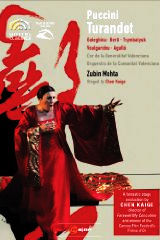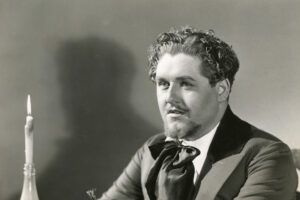
I’m sure I do not need to tell the mostly New-York based readers of parterre this, but Turandot is an opera that can really be turned into a pageant. Not that that’s a bad thing. It is, after all a fairy tale, and so when directors attempt to delve deep into the psychology of Puccini’s icy Princess and her unnamed-for-two-and-a-half-acts Prince, they tend to come up short on actual ideas and long on self-indulgent concepts grafted onto the work. (David Pountney’s production from Vienna, also available on DVD, is a clear-cut example of this problem.)
Turandot appears to be an opera that doesn’t stand up well to directorial fiddling, and most staging seem to leave the drama in the music and surround the cast with as many dancers, supernumeraries and choristers in funny hats as possible. So it is gratifying to finally have a production on DVD that inserts clear, striking ideas into the staging while remaining grounded in Puccini’s score. Led by a first-time director with clear ideas and a veteran conductor, this Turandot should be a watershed. Unfortunately, an uneven cast gets in the way of a total success.
First, the good news: This production from the Palau de les Arts Reina Sofía in Valencia, is helmed by Chinese film director Chen Kaige, most famous, as the DVD case and a dull making-of documentary bonus feature are quick to remind us, for Farewell My Concubine, a drama about the lives of apprentice singers in a Peking opera troupe. This Turandot was his first opera production, and he equates himself mostly successfully. Kaige’s staging is practically minimalist compared to the opulent Tornados we are used to.
A unit set, designed by Liu King, designed to resemble a traditional Chinese Opera House, serves the entire opera, and instead of a stage bustling with supernumeraries and over-active choristers, Kaige keeps his central playing area mostly clear for the principles. Chen Tong Xun’s gorgeous costumes provide enough eye candy that those of us used to opulence do not feel cheated, but Kaige’s refreshing production reminds us that Turandot boils down to a love story, and keeps the focus on Calaf, Turandot and Líu throughout.
That being said, Kaige’s staging takes some time to take some time to get going. His Achilles heel is that he never quite appears to know what to do with the chorus, and the chorus-heavy act one sees them moving aimlessly around. The appearance of Pu-Tin-Pao, a fey-looking dancer instead of the usual muscle-bound super, is risible, and Turandot’s big entrance is totally undercut by having her appear too early.
But once Act II begins, the scene with Ping, Pang and Pong (played more sympathetically than usual) providing a surprising amount of laughs, and a moment of reflective sweetness at the “Honan” trio, strikingly performed while the trio swing back and forth on swings that descend from the flies. After that, the performance gets off the ground, and imaginative touches abound. The Emperor, here both blind and a drunk, seems barely interested in the goings-on.
Turandot is dressed predominantly in a simple red dress, emerging in the usual sparkly gown and crazy headgear only for the highly ceremonial riddle scene. Much is made of Liù’s plight, and when she kills herself (by strangling herself with a sash) it is with a despairing look at Calaf. The Princess is visibly horrified by Liù’s death, and it is clearly that more so than Calaf’s kiss, which lasts all of three seconds, which leads to her change of heart.
The musical forces at the Palau don’t let their side down, either. Led by Zubin Mehta, the Orquestra de la Comunital Valenciana plays thrillingly (the horns are especially good) and the chorus work is generally strong. Mehta’s tempi are on the slow side throughout, but the tension never lags and he drags out a great deal of detail from the score’s resources.
So what goes wrong? Apart from a heartfelt, exquisitely sung Liù from Greek soprano Alexia Voulgaridou (a singer to watch), and a Ping (Fabio Previati) who launches the “Ho una casa nell’Honan” trio about as beautifully as I’ve ever heard, the cast is uniformly on the dull side.
Marco Berti, as Calaf, is one of those generic dramatic Italian tenors who can be relied upon to give a sturdy performance with solid high notes and no great musicality or dramatic insight. He does exactly that here, a respectable if unremarkable performance. (Strangely, no attempt whatsoever is made to make him look Asian.) Alexander Tsymbalyuk is a booming Timur, but fails to make any sort of impression in an admittedly thankless role. The two tenors in the P-ng trio (Vincenc Esteve and Roger Padullés) support Previati well but tend to have less than attractive tones. Ventseslav Anastasov’s Mandarin is coarse and gruff, and Javier Agulló’s Altoum sweet-voiced but unsteady.
The worst offender, and the performance’s main demerit, is unsurprisingly the Turandot of Maria Guleghina. She is in better shape than she was on the recent Met simulcast, but it’s still very uneven. The end of “In questa reggia” is not pretty, as Guleghina repeatedly turns squally on the crucial high notes. She has good dramatic ideas for the character, but frankly, she is just not pleasant to listen to. Let me put it this way…when I finally get a chance this January to see Franco Zefferelli’s Turandot, in the theater, I’m glad I will be seeing Lise Lindstrom.
It’s unfortunate that the Palau wasn’t able to gather a more impressive cast for their first DVD release. Otherwise this DVD would be ideal. But opera, especially Puccini, is about the singing, and you can’t have a Turandot without a Turandot.



























Comments